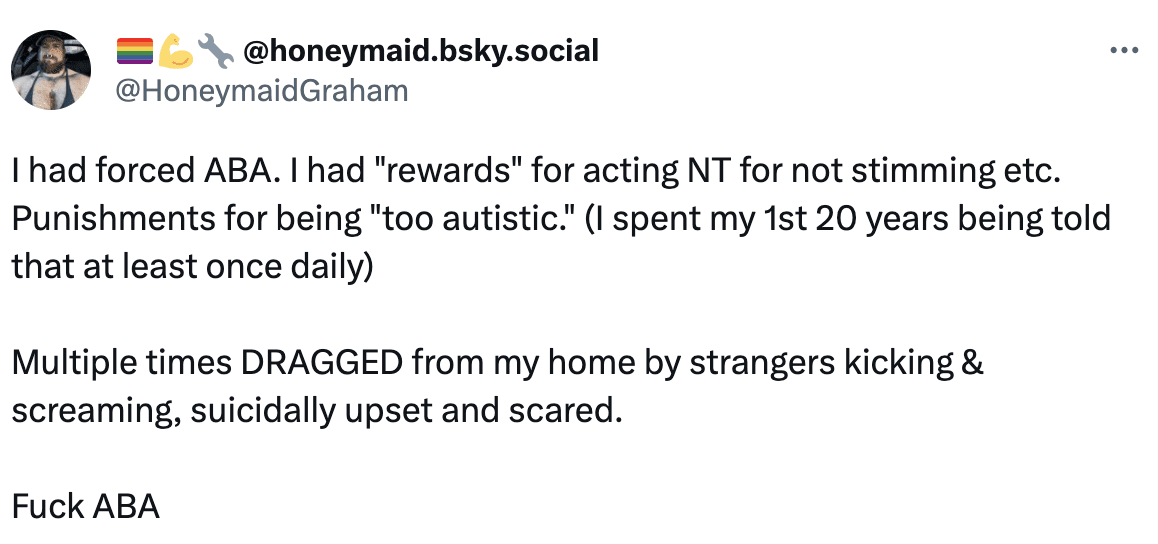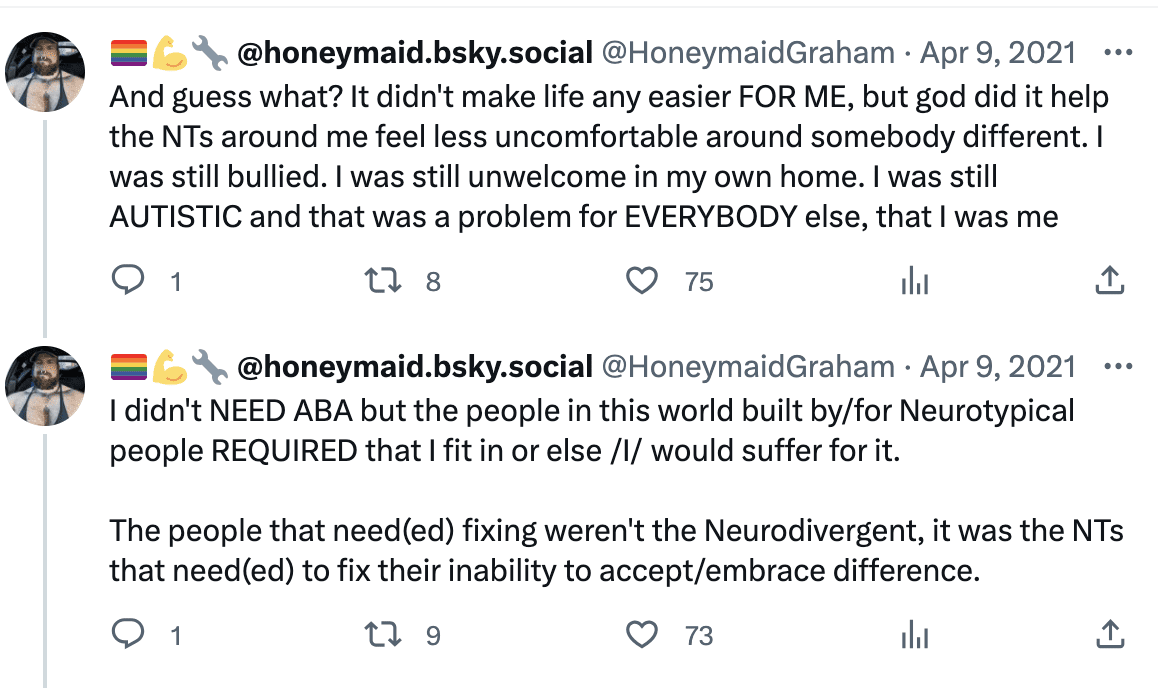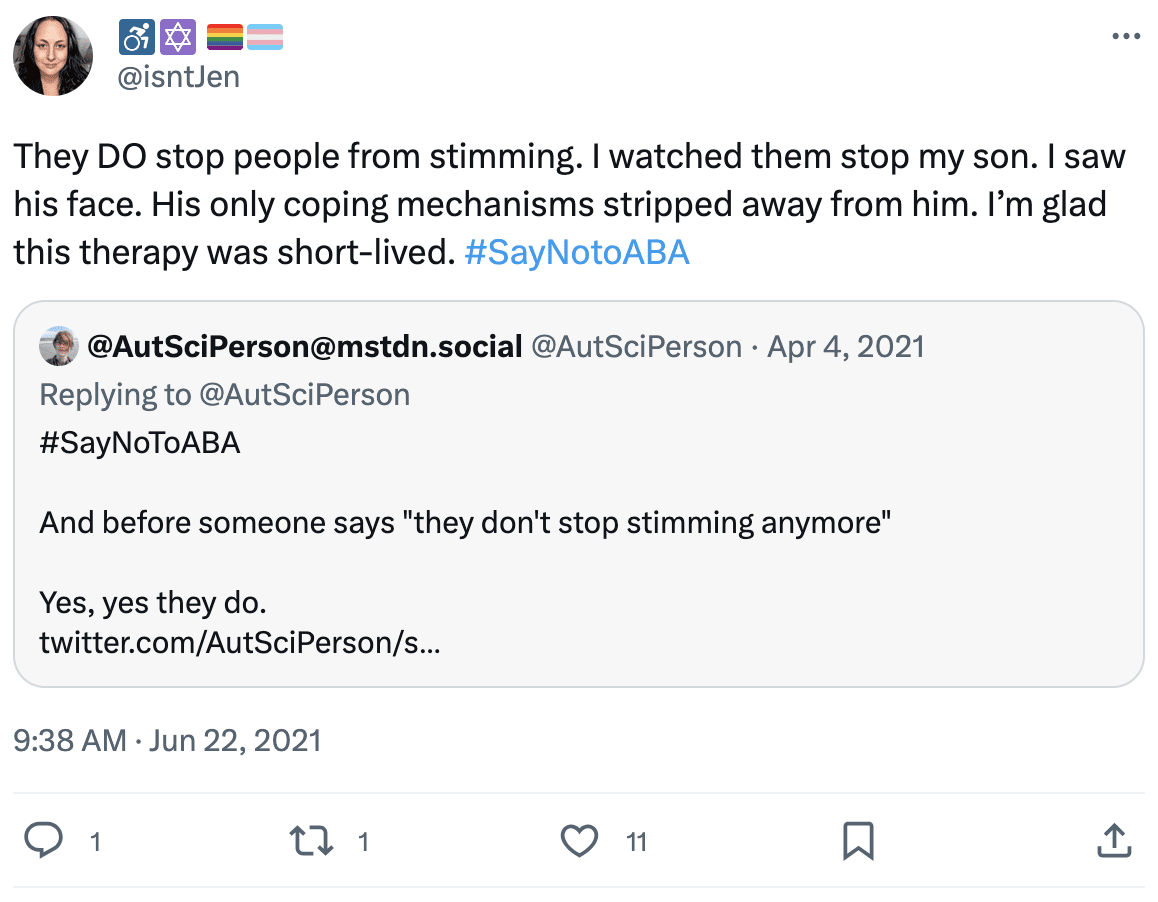The Disturbing Unethical Reality of ABA: Autistic Adults Speak Out
A. Brief Background on Applied Behavioral Analysis (ABA) Therapy and Its Intended Purpose
Applied Behavioral Analysis (ABA) therapy is a widespread treatment model extensively employed within the field of autism therapy. Clinically practiced since the 1960s, ABA’s main goal is to enhance socially acceptable behaviors and lessen harmful or “nonfunctional” ones in autistic children.
ABA breaks down tasks into simple steps, uses desensitization, rewards positive behavior, and uses repetition until the child learns the desired behavior. ABA is seen as the “gold standard” in therapy for autistic individuals.
B. Introduction to the Controversy Surrounding ABA Therapy from the Perspective of Autistic Adults
However, ABA therapy is not free from controversy. Recent years have seen advocates and self-advocates speaking out about the potentially unethical aspects of ABA. Criticism revolves around the therapy’s intense direction, its foundation compliance, necessity for compliance, riddance autonomy, and the use of abusive and harmful techniques that lead to a high risk of PTSD in autistic adults who underwent ABA therapy as children.
The ABA Unethical discourse largely comes from autistic adults recounting their own experiences. Their testimonials illuminate the concerning reality of ABA therapy that the proponents seem to ignore or dismiss in their quest for ‘treatment’ and so-called ‘improvement’.
C. Rationale for Exploring the Experiences and Views of Autistic Adults on ABA Therapy
Yet these perspectives are often ignored, silenced, or countered with arguments detailing the necessity of ABA therapy, especially established by insurance companies who routinely refuse to pay for any other model of autism therapy. This leads us to question: Do healthcare companies and professionals not listen to autistic individuals because they don’t believe they know whats best for themselves? Shouldn’t their experiences shape the models we promote and propagate for their care?
This article explores these testimonials from numerous autistic adults who underwent ABA therapy as children. The disturbing, unethical reality they recount urges us to reconsider ABA’s current stand as the ‘gold standard’ therapy for autism, reflecting on its numerous ethical drawbacks and abuses in practice.
Photo by Patrick Tomasso on Unsplash
A. Personal Stories of Negative Experiences with ABA Therapy
1. Detailed Accounts of Autistic Adults Who Underwent ABA Therapy
a. Description of Therapy Sessions and Techniques Used
Autistic adults who have undergone ABA have shared detailed accounts of their experiences, shedding light on what occurs during ABA therapy sessions. They describe practices where the sole goal was compliance, with the child being taught to follow instructions swiftly and unquestioningly – a hallmark of ABA therapy’s oppressive tactics.


b. Impact of ABA Sessions on Their Mental Health and Self-Esteem
These coercive techniques often have devastating impacts on the mental health of autistic children, leading to negative ABA experiences that cause long-term harm. Adults have reported lingering feelings of worthlessness, anxiety, and depression. The persistent aim to “normalize” them has given many a sense of being fundamentally flawed – merely an unfortunate deviation from the standard.
Many describe experiencing intense stress and anxiety during their ABA sessions, some even leading towards suicidal tendencies. Such harmful effects of ABA have lasted well into their adulthood, impacting their self-esteem and ability to trust others.
c. Their Ultimate Conclusion about the Ethicality of ABA Therapy
Reflecting on these experiences as adults, it’s hardly surprising to understand why many consider ABA unethical. The therapy’s overemphasis on compliance without consideration for personal comfort or consent is viewed as a breach of basic human rights. Several victims now advocate against ABA, arguing it as more of a systematic oppression than a supportive therapy, advocating for recognition of the ethical issues in ABA.
2. Analysis of Common Themes in Personal Narratives Relating to Trauma and Negative Experiences
a. Identifying Shared Elements of Trauma and Distress
As we delve into the traumatic ABA narratives, certain shared elements of distress surface. Autistic adults frequently express feelings of dread associated with therapy sessions, enduring conditions where their instinctual needs and habits were deprived or punished.
Common stories involve the disregarding of their comfort zones, forced to endure stressful situations without an escape. The suppression of stimming – a comfort mechanism in autistic individuals – is another common thread linked to a disturbing ABA reality.
 b. The Effect of These Experiences on Their Current Perspective of ABA
b. The Effect of These Experiences on Their Current Perspective of ABA
These traumatic or negative experiences are not simply ‘childhood memories’. They have carved deep into their lives, shaping the lens through which they now perceive ABA – as an institution enforcing conformity rather than accepting and fostering individuality.
This stands as substantial criticism of ABA therapy, pushing for the reconsideration of current practices in light of the autistic adults’ testimony.
c. Linking These Experiences to Specific Aspects of ABA Therapy, Such as Specific Techniques and the Attitudes of Therapists
The expounded trauma stories hold thematic connections to certain aspects of the ABA – the rigidity of technique, the routinization of punishment, and the underlying dismissal of personal choice shine through almost each narrative.
The narrated personal experiences provide a lens into a systemic problem with the portrayal and approach of therapy providers. They also raise a pertinent question: if the aim is to uplift their lives, how do so many end up with such painful experiences?
3. Reflecting on the Silence or Denial of These Experiences by Healthcare Industry
a. Facts About the Healthcare Industry Ignoring or Rejecting These Narratives
The sheer volume of negative experiences and the resonating ABA controversy make it impossible to dismiss these narratives as ‘isolated cases.’ Yet, the healthcare industry seems to do exactly that – overlook or even outright reject these frequent narratives. Whether it’s a conscious denial or unconscious ignorance, these voices remain unheard, the abuse claims often buried under the rug.
b. Assertion of the Rights of Autistic Individuals to Voice Their Experiences and Have them Recognized
Such silent or vocal denials from healthcare professionals are a stark violation of autistic adults’ rights to voice their experiences and to have these experiences recognized. If the very professionals they rely on for support refuse to acknowledge their pain, it reiterates the underlying unethicalities fostered by ABA therapy.
Photo by Maria Oswalt on Unsplash
B. Examination of ABA Therapy from an Ethical Standpoint
1. Discussion on Principles of Ethics Violated by ABA
a. Comparison of ABA Therapy Techniques with Ethical Guidelines in Healthcare
When viewed in light of ethical guidelines embraced within general healthcare scenarios, ABA therapy’s techniques often appear controversial, contributing to the growing ABA controversy. Standards like respect for autonomy, ensuring the individual’s well-being, and avoiding harm wherever possible form the essence of medical ethics.
However, the techniques used in ABA therapy often directly contradict these principles. The overemphasis on making autistic individuals ‘indistinguishable from their peers’ often violates their autonomy, resulting in abuse claims and criticism of ABA therapy.
b. Instances Where ABA Therapy Contradicts These Guidelines
Autistic adults against ABA recount many instances that unveil these contradictions. Experiences focused on the intense suppression of stimming – a stress-coping mechanism for autistic individuals – is but an example of the ethical drawbacks of ABA.


ABA programs’ rigidity often results in a lack of customization or flexibility to account for an individual’s comfort, personal interests, or talents. This one-size-fits-all approach frequently clashes with the core healthcare principle of prioritizing patient wellbeing.
c. Analysis of the Justification for These Violations in Terms of Outcomes vs Ethics
Despite these concerns, justifications for the ethical breaches in ABA therapy often land on the premise of its perceived effectiveness. Advocates for ABA tout its structured, data-driven methodology, emphasizing its reported achievements in helping autistic children develop essential skills.
Yet, when we actually look at the research, their is a huge lack of efficacy.
hese justifications often fall short when measured against the ethical issues of ABA and the impact on the mental health of those subjected to it. Given the vivid accounts of trauma stories, we must question: How do any practitioners believe the outcome is worth the cost? Especially, when the outcome is an individual who can now conform to NT society at the cost of everything.
2. Criticism by Experts on ABA’s Ethical Mismatch
a. Opinions of Various Experts Who Have Criticized ABA Therapy from an Ethical Standpoint
Many experts have voiced their concerns about the ABA’s ethical mismatch. Psychologists, counselors, and even some ABA practitioners have put forth their criticism of ABA therapy, faulting its coercive techniques and disregarding the individuals’ autonomy and voice.
b. Analysis of Their Arguments, Backed by Evidence and Data
An analysis of their arguments unveils a common thread: the concern over the psychological impact of ABA and demands that autistic individuals endure. The consistent overemphasis on normalizing behaviors often overshadows respect for individuality and personal growth. ABA is the antithesis of autonomy because it only works through compliance. If an individual is never allowed to say no, then consent isn’t possible and neither is autonomy. The available narratives serve as a testament to this,supporting these expert views with real-life accounts.
c. Findings Related to the Ethical Drawbacks of ABA Therapy
The findings from these testimonies and evaluations expose ABA’s lack of autonomy for autistic individuals, its emphasis solely on conformity, and the enabling of negative mental health outcomes. It brings to the forefront the need to reconsider the methods employed in ABA therapy and to ensure a more humane and empathetic approach. Now, attempting to make ABA ethical is analogous to making gay conversion therapy ethical. It is impossible. We must reinvent what therapy looks like for the ND community.
3. Illustration of Alternative Methods that Respect Ethics and Autistic Individuals
a. Introduction to Other Therapeutic Methods That Are Claimed to Be More Ethical
Alternatives to ABA therapy do exist. Therapies such as the neurodivergent-informed therapy or art therapy, emphasize respect for an autistic child’s individuality. These approaches focus on autistically driven growth and foster a relationship-centric model.
b. Comparison Between These Alternative Methods and ABA Therapy
In contrast to ABA, these therapeutic models underscore the value of accepting autistic behaviors rather than suppressing them for the sake of normalization. They advocate for understanding and meeting autistic individuals within their comfort zones instead of forcefully dragging them out.
Encouragingly, growing evidence supports the effectiveness of these humane approaches. They present an alternative narrative – one where therapy is not associated with trauma, but understanding, acceptance, and growth on their terms.
Photo by Priscilla Du Preez 🇨🇦 on Unsplash
C. Role of Insurance Companies and Healthcare System in Promoting ABA
1. Investigation into the Backing of ABA Therapy by Insurance Companies and Healthcare System
a. Description of the Extent of Financial Backing and Promotion
Despite the growing ABA controversy, insurance companies and the broader healthcare system continue to support and promote ABA. It’s not unusual for insurance companies to cover ABA therapy, often advocating it as the only ‘evidence-based’ intervention for autism. This has further entrenched ABA practices within the healthcare system, making it a standard therapy for autistic children.
b. Unpacking the Justifications for this Support
The basis for this support often lies in ABA’s reputation as a structured, data-driven treatment model (Which we know to be false). Insurance companies prefer this measurability factor as it provides tangible proof of ‘progress’. However, these justifications don’t account for the ethical drawbacks of ABA and the traumatic experiences many autistic individuals report.


c. Query into the Validity of These Justifications
When we put these justifications under scrutiny and confront them with the growing testimonies of autistic adults who underwent ABA therapy as children, the validity of the arguments seems questionable. Unsettlingly, the decision-makers seem to prioritize measurable outcomes over the mental health implications that ABA frequently brings along.
2. Expose on the Suppression of Autistic Voices by These Entities
a. Examination of Allegations About Suppression of Negative Experiences and Criticism
The deafening silence from insurance companies and healthcare systems regarding the negative ABA experiences is alarming. Critics argue that this silence is not coincidental but an active suppression of voices that challenge the system. There is considerable evidence of dismissal or minimization of autistic adults’ testimonies and ABA therapy abuse claims.
b. Link Between Financial Interests and Denial of Allegations
The question arises: do financial interests in continued ABA therapy influence the active denial of these allegations? With insurance companies often refusing to cover alternative therapies, it seems there’s a systemic preference for ABA that overlooks its ethical issues and the negative impact on mental health.
c. Demand for a More Inclusive Perspective That Respects the Rights and Experiences of Autistic Individuals
This practice stands in stark contrast with the principle of inclusivity, which necessitates respecting and prioritizing the voices of the autistic community. A shift towards a more inclusive approach that values the experiences of autistic individuals is long overdue.
3. Call to Action for a Shift in Treatment Paradigm
a. Need for a Paradigm Shift Acknowledging Autistic Voices in Defining Treatment
As we unravel the unethical reality of ABA and the systemic biases in coverage, there is a pressing need for a paradigm shift. It’s time for a treatment approach that acknowledges the voices of autistic individuals – accounting for their wellbeing and respecting their stake in defining effective treatments.
b. Suggestions for Concrete Steps in Changing Industry-Wide Attitudes Towards Autistic Individuals and Their Experiences
To achieve this shift, insurance companies and healthcare providers must open their doors to therapies recognizing the rights of autistic individuals. It requires a re-evaluation of policies to include therapies with a more humane and less traumatic approach.
In the absence of such an overhaul, the ABA controversy will continue to cast a long shadow over autism therapy, trampling on the lived experiences and voices of the very people it claims to help.
A. Recap of Key Arguments Against the Ethicality of ABA Therapy from the Perspective of Autistic Adults and Ethical Guidelines in Healthcare
This blog has critically examined the unethical aspects of ABA therapy from various perspectives – the personal accounts of autistic adults who experienced it firsthand, the ethical guidelines propounded by the healthcare community, and the viewpoints of professionals and experts in the field. The shared narratives describe a chilling scenario of coerced compliance, suppression of individuality, and psychological trauma associated with ABA therapy techniques.
These accounts contradict ABA’s current standing within many healthcare and insurance systems where it is hailed as the ‘gold standard’ of autism therapy. The disturbing picture painted by these testimonials brings forth the fact that ABA often neglects vital ethical standards of healthcare. Autistic individuals are pushed to adapt to ‘normality,’ leaving their comfort and autonomy at the bay in the pursuit of a socially acceptable stance of behaviors.
The continued support and promotion of ABA therapy by healthcare bodies and insurance providers despite these alarming drawbacks and shaky ethical foundations are equally alarming. These entities often remain ignorant, consciously or unconsciously, of these traumatic narratives, effectively silencing the autistic population in the discussion surrounding their care.
B. Reiteration of the Need for Radical Change in Treatment Paradigms and Respect for the Autonomy and Experiences of Autistic Individuals
Through the lens of these testimonials and in the light of ethical guidelines, a clear conclusion emerges: ABA therapy needs to be dismantled. Some could say that a radical transformation is possible, but once again making ABA ethical is as impossible as making gay conversion therapy. The foundation of the therapy is rotten and so anything built on top of that will be rotten too. All parties involved, including healthcare bodies, insurance providers, therapists, and society at large, need to respect the autonomy and personal experiences of autistic individuals rather than imposing a standpoint of ‘normality’.
The ingrained biases and preferential treatment towards ABA need to be challenged and re-evaluated. The unheard testimony of autistic adults and the chilling ABA trauma stories have to fight a battle against the ingrained system and societal norms. These justifications based on structured formatting and measurement of progress are fast losing ground against the mounting evidence of the harm ABA can inflict on the mental health of those subjected to it.
The time is due for an inclusive approach that respects the individuality of autistic individuals. The upcoming therapies that emphasize autistically driven growth and incorporate personal choice offer a glimmer of hope. But for their success, we need a comprehensive shift in perspective – one that prioritizes empathy and understanding over rigid conformity. Until then, the fight for ethical autism therapies continues.



 b. The Effect of These Experiences on Their Current Perspective of ABA
b. The Effect of These Experiences on Their Current Perspective of ABA

